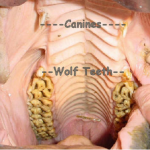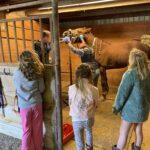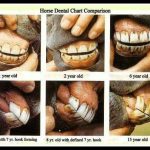Teeth care is an often-overlooked aspect of horse ownership, but it’s one of the most important parts of ensuring your horse’s overall health and well-being. A horse’s teeth play a crucial role in its ability to properly chew food and absorb nutrients, which in turn affects its digestion and general comfort. Poor dental health can lead to a wide range of problems, from difficulty eating to weight loss and painful infections.
In fact, in order to adopt from Layla Rose Ranch, we will check to make sure the adopter has a person and practice for maintaining the horse’s teeth. We will interview the veterinarian or dentist to see how well the potential adaptor has taken care of horses’ teeth in the past.
Understanding Horse Teeth Anatomy
Before diving into care practices, it’s important to familiarize yourself with the structure of a horse’s teeth. Like humans, horses have a set of incisors, premolars, and molars, but they have a unique dental structure suited to their herbivorous diet and chewing habits.
- Incisors: These are the sharp, chisel-shaped teeth at the front of the horse’s mouth, used for cutting grass and other food. Horses typically have six upper and six lower incisors.
- Canine Teeth: Located just behind the incisors, canine teeth (also known as “tushes”) are present primarily in male horses. These teeth are used for fighting or establishing dominance in wild horses, but they are not essential for eating.
- Premolars: Behind the canines, the premolars are used for grinding food. These teeth are flatter than the incisors and are essential for the mechanical breakdown of fibrous plant material.
- Molars: The molars are the large, flat teeth at the back of the horse’s mouth. These teeth are also used for grinding food, and they are vital in breaking down tough forage and hay.
- Wolf Teeth: Wolf teeth are small, vestigial teeth that are located in front of the first molars. They are more common in
 males and may need to be removed if they interfere with the bit during riding or driving.
males and may need to be removed if they interfere with the bit during riding or driving.
The Importance of Regular Teeth Care
Just like with human dental health, a horse’s teeth need regular care to ensure they stay healthy and function properly. Without proper maintenance, a horse can suffer from dental problems that could affect its ability to chew and eat, ultimately leading to malnutrition, weight loss, or even painful conditions like abscesses and infections.
Here are the most essential components of horse dental care:
- Floating: One of the most common dental procedures for horses is “floating,” which involves filing down the sharp points that develop on a horse’s teeth over time. These sharp edges can cause painful sores in the horse’s mouth, making it difficult for them to chew properly.

- Fun Fact: The term “floating” comes from the old practice of using a float (a large rasp or file) to smooth out the sharp edges of the teeth.
Horses’ teeth grow throughout their lives, and as they chew, they naturally develop sharp points, particularly on the upper molars. Floating ensures that these points are smoothed down, preventing discomfort and allowing the horse to chew more efficiently.
- Routine Dental Examinations: Dental checkups should be performed by a veterinarian or equine dentist at least once a year, although some horses may need more frequent care, especially if they show signs of dental problems or if they are older horses. During a dental exam, the vet will look for issues such as uneven wear, broken teeth, infections, or abscesses.
- Fun Fact: Horses have two sets of teeth in their lifetime. The first set, known as “milk teeth,” erupts around six months of age and is replaced by permanent teeth between two and five years old.
The veterinarian will also assess the overall alignment of the teeth and any signs of dental disease, such as periodontal disease, which is the inflammation or infection of the tissues around the teeth.
- Dietary Considerations: A horse’s diet has a significant impact on its dental health. Horses that are fed a diet that is too soft (like processed grains or chopped hay) may not wear down their teeth properly. This can lead to an overgrowth of the teeth, causing pain or discomfort when chewing.
- Fun Fact: Wild horses naturally consume a rougher diet, which helps wear down their teeth evenly. This is why horses in the wild often have better teeth than those in captivity, provided they have access to plenty of forage.
To encourage proper dental wear, it’s important to feed horses a balanced diet that includes plenty of roughage, such as grass or hay. This helps naturally wear down the teeth, keeping them in better shape.
- Signs of Dental Problems: Knowing how to spot signs of dental issues early can prevent more serious problems down the road. Some common symptoms of dental issues in horses include:
- Difficulty chewing or dropping food
- Weight loss or a drop in condition
- Excessive salivation or drooling
- Foul-smelling breath
- Resistance to the bit or difficulty accepting the bit
- Head tilting or excessive tossing of the head
Fun Fact: Horses are often very good at hiding pain, so it’s important for owners to regularly check for any subtle signs of discomfort that could indicate dental problems.
- Tooth Extraction: In some cases, horses may need a tooth extracted, particularly if the tooth is severely decayed or fractured. This is more common in older horses whose teeth may wear down unevenly over time. Wolf teeth, which are small teeth located near the molars, may also need to be removed if they interfere with the bit during riding.
Common Dental Issues in Horses
While regular dental care helps prevent many issues, horses are still prone to several common dental problems:
- Sharp Points: As horses age, sharp points can develop on their molars due to uneven wear. These sharp points can cut the inside of the horse’s mouth, making it painful to chew. Floating is the most common way to address this issue.
- Broken Teeth: Horses are prone to breaking their teeth, particularly if they chew on hard objects or have uneven wear. A broken tooth can cause infection and pain if not treated promptly.
- Periodontal Disease: Just like humans, horses can develop gum disease, which can lead to infection and tooth loss if left untreated. Regular dental exams help catch this early.
- Tooth Root Abscess: A tooth root abscess is an infection of the tissue surrounding the root of the tooth, often caused by a fractured tooth. It can lead to swelling and significant pain.
- Malocclusion: This condition refers to misalignment of the teeth, which can make it difficult for the horse to chew properly. It may require treatment from a specialist to correct the issue.
Fun Facts About Horse Teeth
- Horses’ Teeth Continue to Grow: A horse’s teeth grow throughout its life, starting with milk teeth at around 6 months of age. The permanent teeth come in between the ages of 2 and 5, and the teeth continue to wear and grow as the horse ages. By around the age of 30, some horses may experience significant dental wear and may require extra care.
- Horses Have No Upper Front Teeth: Horses have no upper incisors, which is why they cannot bite like humans. Instead, they grasp food with their incisors and use their molars to grind it down.
- Teeth Can Tell a Horse’s Age: A horse’s teeth provide clues about its age. Younger horses have smoother, more rounded teeth, while older horses show more signs of wear and tear. Veterinarians can often determine a horse’s age by examining its teeth, a practice known as “dentition aging.”

SOURCE saddleupColorado - Wolf Teeth Are Not Essential: Not all horses have wolf teeth, and in many cases, these small teeth are removed because they can interfere with the placement of the bit during riding. However, some horses never develop wolf teeth at all.
Dental care for horses is an essential part of keeping them healthy and comfortable. Just like humans, horses need regular attention to their teeth to prevent issues that can interfere with their ability to eat, drink, and enjoy life. From floating and routine dental exams to maintaining a healthy diet and recognizing signs of problems, taking good care of your horse’s teeth will help ensure it remains in top shape for years to come.
By being proactive about dental health, you can prevent many common dental issues and help your horse live a long, healthy, and comfortable life. Whether your horse is a working companion or a beloved pet, regular dental care will ensure they can continue to enjoy the things they love, from grazing on lush pastures to galloping in the open fields.

 males and may need to be removed if they interfere with the bit during riding or driving.
males and may need to be removed if they interfere with the bit during riding or driving.
